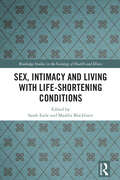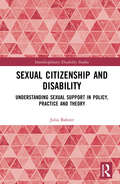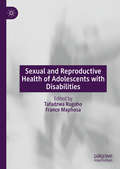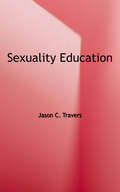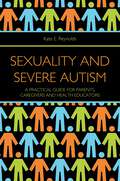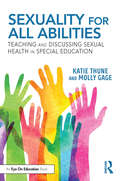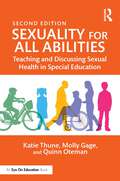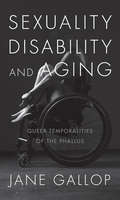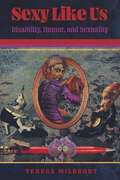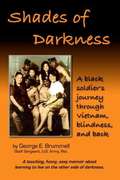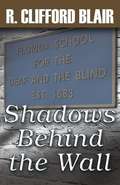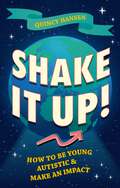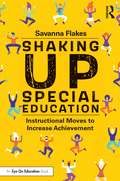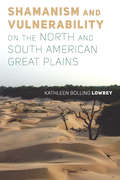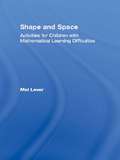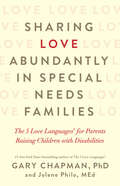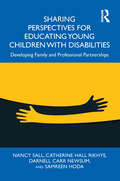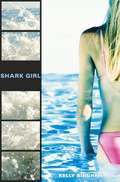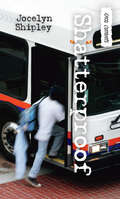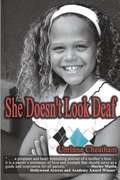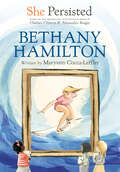- Table View
- List View
Sex, Intimacy and Living with Life-Shortening Conditions
by Sarah Earle Maddie BlackburnThis multi-disciplinary and inclusive collection brings together theoretically informed and empirically focused research on sex, intimacy and reproduction in relation to young people and adults with life-shortening conditions. Advances in healthcare mean that increasing numbers of young people with life-shortening conditions are transitioning into adulthood. Issues such as sex and intimacy, dating and relationships, fertility and having children are increasingly relevant to them and to the people that support them, including families, carers, practitioners and professional education, health and social care agencies. This three-part book explores the relevance and significance of this field, examines everyday experiences, and highlights the challenges faced by individuals and organisations in addressing the needs of such people in daily life and in the context of practice. Drawing on perspectives from sociology, disability studies, epidemiology, health policy, psychotherapy, legal studies, queer studies and nursing, this ground-breaking volume is written by academics, policy makers, practitioners and experts by experience. It is an essential read for all those practising and researching in the fields of sexuality, chronic illness and disability and transition.
Sexual Citizenship and Disability: Understanding Sexual Support in Policy, Practice and Theory (Interdisciplinary Disability Studies)
by Julia BahnerWhat does ‘sexual citizenship’ mean in practice for people with mobility impairments who may need professional support to engage in sexual activity? The book explores this subject through empirical investigation based on case studies conducted in four countries – Sweden, England, Australia and the Netherlands – and develops the abstract notion of ‘sexual citizenship’ to make it practically relevant to disabled people, professionals in disability services and policy-makers. Through a cross-national approach, it demonstrates the variability of how sexual rights are understood and their culturally specific nature. It also shows how the personal is indeed political: states’ different policy approaches change the outcomes for disabled people in terms of support to explore and express their sexualities. By proposing a model of sexual facilitation that can be used in policy development, to better cater to disabled service users’ needs as well as furthering the theoretical understanding of sexual rights and sexual citizenship, this book will be of interest to professionals in disability services and policy-makers as well as academics and students working in the following subject areas: Disability Studies, Sociology, Social Policy, Sexuality Studies/Sexology, Social Work, Nursing, Occupational Therapy and Public Health.
Sexual and Reproductive Health of Adolescents with Disabilities
by Tafadzwa Rugoho France MaphosaThis book investigates various experiences of teaching sexual and reproductive health to adolescents with disabilities. Following the adoption of the UNCRPD, adolescents with disabilities still commonly suffer from widespread violation of their rights particularly concerning sexual and reproductive health – often being viewed as either asexual or hypersexual. Contemporary societies do not readily encourage the participation of these young people in conversations or decision making processes concerning their own sexual and reproductive health. This book delves into such complex issues, critically examining how global communities attempt to teach sexual and reproductive issues to adolescents with disabilities in the modern era.
Sexuality Education (PRO-ED Series on Autism Spectrum Disorders, Second Edition)
by Jason C. Travers"This book promotes the use of a behavior analytic approach and encourages and supports the provision of comprehensive sexuality education (CSE) for healthy and safe sexual development of learners with autism"
Sexuality and Severe Autism: A Practical Guide for Parents, Caregivers and Health Educators
by Kate E. ReynoldsSexual health and sexuality can be difficult subjects for parents and caregivers to broach with autistic children, made more challenging when children are at the severe end of the autism spectrum. Some parents may even question the validity of teaching sexuality to those who are severely autistic. This practical handbook guides you through the process of teaching about sex and sexuality, answering all of the most crucial questions, including: Why is it necessary to teach this subject to my severely autistic child? When is the right time to start talking about these issues? How detailed and explicit should I be? What methods are most appropriate? It addresses male and female issues separately and covers public and private sexual behaviours, sexual abuse, cross-gender teaching and liaising with school, in addition to the more obvious areas such as physical changes and menstruation. This will be the ideal guide to teaching about sexual issues for any parent, caregiver or health educator caring for a person on the severe end of the autism spectrum.
Sexuality for All Abilities: Teaching and Discussing Sexual Health in Special Education
by Katie Thune Molly GageThis essential manual helps educators comfortably and knowledgeably bring comprehensive sex education to the special education classroom. Drawing on firsthand experience and real-world examples, the first half provides background material—including common roadblocks—and tools for how to effectively partner with parents. The second half breaks down the how-tos of implementing a successful sex education program and troubleshoots tricky situations that might come up in the special education classroom. Written in accessible, person-first language, this guide equips you with best practices for providing students with developmental disabilities with the knowledge and tools to engage in healthy relationships and live full lives as self-advocating sexual beings.
Sexuality for All Abilities: Teaching and Discussing Sexual Health in Special Education
by Katie Thune Molly Gage Quinn OtemanThis essential manual helps educators comfortably and knowledgeably deliver lessons in comprehensive sex education to young people with developmental disabilities in the context of special education. Drawing on firsthand experience and real-world examples, the first half provides background material and tools for how to effectively partner with parents. The second half breaks down the how-tos of implementing a successful sex education program and troubleshoots tricky situations that might come up for a variety of students. Updated with new material on implementing lessons and on gender, as well as reflection questions and personal stories from self-advocates, this second edition equips you with best practices for providing students with developmental disabilities with the knowledge and tools to engage in healthy relationships and live full lives as self-advocating sexual beings.
Sexuality, Disability, and Aging: Queer Temporalities of the Phallus
by Jane GallopDrawing on her own experiences with late-onset disability and its impact on her sex life, along with her expertise as a cultural critic, Jane Gallop explores how disability and aging work to undermine one's sense of self. She challenges common conceptions that equate the decline of bodily potential and ability with a permanent and irretrievable loss, arguing that such a loss can be both temporary and positively transformative. With Sexuality, Disability, and Aging, Gallop explores and celebrates how sexuality transforms and becomes more queer in the lives of the no longer young and the no longer able while at the same time demonstrating how disability can generate new forms of sexual fantasy and erotic possibility.
Sexy Like Us: Disability, Humor, and Sexuality
by Teresa MilbrodtSexy Like Us: Disability, Humor, and Sexuality takes a humorous, intimate approach to disability through the stories, jokes, performances, and other creative expressions of people with disabilities. Author Teresa Milbrodt explores why individuals can laugh at their leglessness, find stoma bags sexual, discover intimacy in scars, and flaunt their fragility in ways both hilarious and serious. Their creative and comic acts crash, collide, and collaborate with perceptions of disability in literature and dominant culture, allowing people with disabilities to shape political disability identity and disability pride, call attention to social inequalities, and poke back at ableist cultural norms. This book also discusses how the ambivalent nature of comedy has led to debates within disability communities about when it is acceptable to joke, who has permission to joke, and which jokes should be used inside and outside a community’s inner circle. Joking may be difficult when considering aspects of disability that involve physical or emotional pain and struggles to adapt to new forms of embodiment. At the same time, people with disabilities can use humor to expand the definitions of disability and sexuality. They can help others with disabilities assert themselves as sexy and sexual. And they can question social norms and stigmas around bodies in ways that open up journeys of being, not just for individuals who consider themselves disabled, but for all people.
Shades of Darkness: A Black Soldier's Journey Through Vietnam, Blindness, and Back
by George E. BrummellThe last image I ever saw--the instant before my eyes were seared by a landmine explosion in the jungles of Vietnam--is always with me. Many times during the past forty years, I have thought of myself as unlucky. But a soldier I met recently left me wondering. The meeting happened on a visit with a friend and fellow Vietnam veteran to Walter Reed Army Hospital in Washington, D.C., where some of America's wounded warriors from Iraq and Afghanistan were being treated.
Shadows Behind the Wall
by R. Clifford Blair<p>The Florida School For The Deaf And The Blind is the setting for this fictional account of the daily lives of students in the school and the tragedy that occurred there. Chris Montgomery, a seventeen year old recently diagnosed with a severe vision disorder, learns to function in the unusual environment of a state institution and unexpectedly finds first love there. <p>He meets and befriends a number of characters including Wesley Monroe who announces with meticulous detail, football games that are played only in his mind, and Dog Chandler who has dedicated himself to closely monitoring the development of Mouseketeer Annette Funicello's breasts. <p>An animosity develops between Chris and the school principal, contributing to Chris being suspected of the sexual assault of a young girl who, being blind, cannot identify her attacker. <p>Chris befriends and eventually falls in love with Mrs. Gray, one of the adult supervisors, whose room is on the second floor of his dormitory. Being married, she half-heartedly tries to discourage the crush Chris is developing for her, but enjoys his company and the help he provides in caring for the young boys in her charge. <p>Chris is particularly helpful in monitoring two of the young boys under her care who have developed an unusual dependence on each other and tend to wander away from the supervised group. Even more problematic is their newly developed tendency to slip from the dormitory at night to wander about campus. Chris cares for the young boys who return his affection. <p>Chris' actions inadvertently set in motion a series of events that precipitate a tragedy which shapes the remainder of his life. He covers up his part in the tragedy but finds he cannot escape the consequences of what he has done. He returns to the school forty years after graduation in an attempt to resolve issues related to the unfortunate event but finds solace illusionary.</p>
Shake It Up!: How to Be Young, Autistic, and Make an Impact
by Quincy HansenWhen you see a problem go unsolved do you feel compelled to act?Does seeing an injustice light a fire within your soul?Do you have a burning passion to take action, or to witness change within your own life, your community, or the world? If so, you may have the makings of an advocate.This inspiring book by autistic blogger Quincy Hansen encourages autistic teens to find their voice and make a difference in the world around them. Featuring interviews with young autistic change-makers and addressing issues like self-image, harmful stereotypes and communication barriers, Shake It Up! aims to build readers' confidence, and inspire them to take action to change the world to be a better place.
Shaking Up Special Education: Instructional Moves to Increase Achievement
by Savanna FlakesShaking Up Special Education is an easy-to-use instructional guide to the essential things you need to know about working with students with exceptionalities. Interactive, collaborative, and engaging, this go-to instructional resource is packed with the top instructional moves to maximize learning for all students. Featuring sample activities and instructional resources, chapters cover topics ranging from specially designed instruction, to co-teaching, to technology, to social-emotional learning and self-care. Designed with special educators in mind, this book is also ideal for any general educator looking to increase student achievement and revitalize their practice. Shake up your teaching and learn how to build a more inclusive classroom!
Shaman
by Noah GordonRobert Jeremy Cole, the legendary doctor and hero of "The Physician," left an enduring legacy. From the 11th century on, the eldest son in each generation of the Cole family has borne the same first name and middle initial and many of these men have followed the medical profession. A few have been blessed with their ancestor's diagnostic skill and the "sixth sense" they call The Gift, the ability to know instinctively when death is impending. The tragedy of Rob J.'s life is the deafness of his son, Robert Jefferson Cole, who is called Shaman by everyone who knows him. Shaman's life is difficult. First, he must learn to speak so that he can take his place in the hearing world, and then he must fight against the prejudices of a society where physical differences matter. As Shaman struggles to achieve his identity, the Coles, along with the rest of America, are drawn into the conflict between the North and the South.
Shamanism and Vulnerability on the North and South American Great Plains
by Kathleen Bolling LowreyIn Shamanism and Vulnerability on the North and South American Great Plains Kathleen Bolling Lowrey provides an innovative and expansive study of indigenous shamanism and the ways in which it has been misinterpreted and dismissed by white settlers, NGO workers, policymakers, government administrators, and historians and anthropologists. Employing a wide range of theory on masculinity, disability, dependence, domesticity, and popular children’s literature, Lowrey examines the parallels between the cultures and societies of the South American Gran Chaco and those of the North American Great Plains and outlines the kinds of relations that invite suspicion and scrutiny in divergent contexts in the Americas: power and autonomy in the case of Amerindian societies and weakness and dependence in the case of settler societies. She also demonstrates that, where stigmatized or repressed in practice, dependence and power manifest and intersect in unexpected ways in storytelling, fantasy, and myth. The book reveals the various ways in which anthropologists, historians, folklorists, and other writers have often misrepresented indigenous shamanism and revitalization movements by unconsciously projecting ideologies and assumptions derived from modern ‘contract societies’ onto ethnographic and historical realities. Lowrey also provides alternative ways of understanding indigenous American communities and their long histories of interethnic relations with expanding colonial and national states in the Americas. A creative historical and ethnographical reevaluation of the last few decades of scholarship on shamanism, disability, and dependence, Shamanism and Vulnerability on the North and South American Great Plains will be of interest to scholars of North and South American anthropology, indigenous history, American studies, and feminism.
Shape and Space: Activities for Children with Mathematical Learning Difficulties
by Mel LeverFirst Published in 2003. Routledge is an imprint of Taylor & Francis, an informa company.
Shared Visions
by John HeilbrunnSome specific books about individual persons and their experiences, achievements and struggles have emerged occasionally, but very few books have been published where a number of persons with a visual impairment tell their stories and paint a picture of their lives. Shared Visions contains 16 interviews with persons who are blind or have low vision from all continents of the world including Australia, Fiji, Iceland, Japan and Rwanda. The interviews depict the individual differences from one person to the other, but also show certain communalities and demonstrate the strong will and preparedness to struggle to fulfill dreams and participate in the fight for the improvement of conditions for visually impaired persons nationally and internationally. Shared Visions is edited by John Heilbrunn,Vice-President of Danish Association of the Blind, Denmark, as a tribute to brave and dedicated persons within the blindness movement around the World and a celebration of the 100 year anniversary of the organization.
Sharing Love Abundantly in Special Needs Families: The 5 Love Languages® for Parents Raising Children with Disabilities
by Gary Chapman Jolene Philo"With a frank and honest observation on how disability can unravel family unity, this book inspires and equips us to live out our faith as we interact with those we love."-Joni Eareckson Tada, founder & CEO, Joni and FriendsBetween the worry, the doctor&’s appointments, and the thousand small challenges of everyday life, it&’s easy to feel overwhelmed and exhausted. The idea of showing abundant love to every member of your family can feel like a daunting task. Jolene Philo has been there. And in this wise, warm, practical guide, she and Dr. Gary Chapman show you how the 5 love languages can help strengthen your marriage and family life—whatever your needs. Sharing dozens of stories from parents of children with special needs children, they teach you how to:protect your marriage amidst the stressdiscover and speak the love language of your child—even if they&’re nonverbalaccommodate the love languages for children with special needs and disabilitiesshow love to every member of your family when you have limited time, money, and energyHaving a special needs child shouldn&’t mean sacrificing a full family life. Learn to share love abundantly no matter your circumstances.
Sharing Love Abundantly in Special Needs Families: The 5 Love Languages® for Parents Raising Children with Disabilities
by Gary Chapman Jolene Philo"With a frank and honest observation on how disability can unravel family unity, this book inspires and equips us to live out our faith as we interact with those we love."-Joni Eareckson Tada, founder & CEO, Joni and FriendsBetween the worry, the doctor&’s appointments, and the thousand small challenges of everyday life, it&’s easy to feel overwhelmed and exhausted. The idea of showing abundant love to every member of your family can feel like a daunting task. Jolene Philo has been there. And in this wise, warm, practical guide, she and Dr. Gary Chapman show you how the 5 love languages can help strengthen your marriage and family life—whatever your needs. Sharing dozens of stories from parents of children with special needs children, they teach you how to:protect your marriage amidst the stressdiscover and speak the love language of your child—even if they&’re nonverbalaccommodate the love languages for children with special needs and disabilitiesshow love to every member of your family when you have limited time, money, and energyHaving a special needs child shouldn&’t mean sacrificing a full family life. Learn to share love abundantly no matter your circumstances.
Sharing Perspectives for Educating Young Children with Disabilities: Developing Family and Professional Partnerships
by Nancy Sall Catherine Hall Rikhye Darnell Carr Newsum Samreen HodaThis important book is an exploration of the ways parents, teachers and academics view the development and schooling of young children with disabilities. It offers an in-depth examination of the common and critical issues that emerge as children and their families first enter the school system, navigate the educational landscape and learn to advocate for their rights. Each chapter of the book presents a parent’s perspective of significant issues, followed by a teacher’s perspective. From their stories, numerous themes are identified and connected to the academic literature. The experiences shared and the literature reviewed address the challenges, successes and opportunities for increased understanding that emerge as parents and educators work together toward a common goal. Sharing Perspectives for Educating Young Children with Disabilities is essential reading for all pre-service and in-service early childhood and special education professionals and parents engaging in the process of listening carefully to others with the aim of supporting the education of young children.
Shark Girl
by Kelly BinghamA teenager struggles through physical loss to the start of acceptance in an absorbing, artful novel at once honest and insightful, wrenching and redemptive. On a sunny day in June, at the beach with her mom and brother, fifteen-year-old Jane Arrowood went for a swim. And then everything--absolutely everything--changed. Now she's counting down the days until she returns to school with her fake arm, where she knows kids will whisper, "That's her--that's Shark Girl," as she passes. In the meantime there are only questions: Why did this happen? Why her? What about her art? What about her life? In this striking first novel, Kelly Bingham uses poems, letters, telephone conversations, and newspaper clippings to look unflinchingly at what it's like to lose part of yourself - and to summon the courage it takes to find yourself again.
Shatterproof (Orca Currents)
by Jocelyn ShipleyThirteen-year-old Nate needs a break from looking after his newly disabled mom. One day when Nate's mom thinks he's at a cross-country meet, he goes to the mall with a friend he's forbidden to have contact with. At the skate shop he sees a new board he can't afford but has to have, and Nate gets talked into running a scam. It turns out Nate looks a lot like a teen TV star filming in the area. So he and his buddy get girls to pay cash to be extras on set. It's all fine until Nate meets a girl he really likes. Nate knows he has to tell her the truth, but he's not sure he has what it takes to come clean. This short novel is a high-interest, low-reading level book for middle-grade readers who are building reading skills, want a quick read or say they don’t like to read! The epub edition of this title is fully accessible.
She Doesn't Look Deaf
by Corinne CheathamShe Doesn't Look Deaf examines the emotions and struggles a parent goes through while raising a deaf child. Parenting is a challenge in and of itself, but add a child with a special need and the stressors increase ten-fold. In the book, Corinne Cheatham shares the denial, anger, and acceptance she experienced when her daughter was diagnosed as being deaf. She describes the obstacles she encountered, and still encounters, while trying to make sure that her daughter receives the best services possible from school districts and businesses. She stresses the importance of parents advocating for their children and provides information on how to educate themselves about the services that are available. She discusses, as well, the laws in place that are supposed to prohibit discrimination on the basis of disabilities. Parents need to make sure that these laws are being enforced, and if they aren't, hold society accountable, because our future generations are worth it.
She Kept Dancing: The True Story of a Professional Dancer with a Limb Difference
by Sydney Mesher Catherine LaudoneThis warm and inviting picture book, cowritten with Catherine Laudone and brightly illustrated by Natelle Quek, takes young readers along on Sydney’s journey—through the joyous ups as well as the crushing downs—and tells the story of how through it all, she kept dancing.No two dances were the same. Each one was beautiful because it was different—just like how Sydney’s body was also beautiful because it was different.Sydney Mesher was born with ten toes and five fingers. But it was her toes that her mom noticed first. "I can tell she’s going to be a dancer," she said.And it turned out Mom was right—after years of hard work, Sydney eventually danced her way onto the famous stage of Radio City Music Hall, becoming the first Rockette with a visible disability.
She Persisted: Bethany Hamilton (She Persisted)
by Maryann Cocca-Leffler Chelsea ClintonInspired by the #1 New York Times bestseller She Persisted by Chelsea Clinton and Alexandra Boiger, a chapter book series about women who spoke up and rose up against the odds--including Bethany Hamilton!Bethany Hamilton learned to surf when she was three years old, and she joined—and won—many surfing competitions as a child. When she was thirteen, while she was surfing one morning, a shark suddenly attacked her and bit off her left arm. Through hard work, courage, and faith, Bethany persisted and went on to reach her dream of becoming a professional surfer. Along the way, she used her experience to provide inspiration and comfort to surfers and non-surfers alike.In this chapter book biography by award-winning author Maryann Cocca-Leffler, readers learn about the amazing life of Bethany Hamilton--and how she persisted. Complete with an introduction from Chelsea Clinton, black-and-white illustrations throughout, and a list of ways that readers can follow in Bethany Hamilton's footsteps and make a difference! A perfect choice for kids who love learning and teachers who want to bring inspiring women into their curriculum.And don&’t miss out on the rest of the books in the She Persisted series, featuring so many more women who persisted, including Harriet Tubman, Marian Anderson, Oprah Winfrey, Ruby Bridges, and more!
